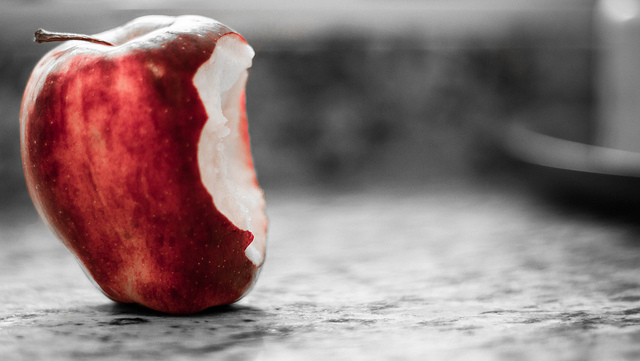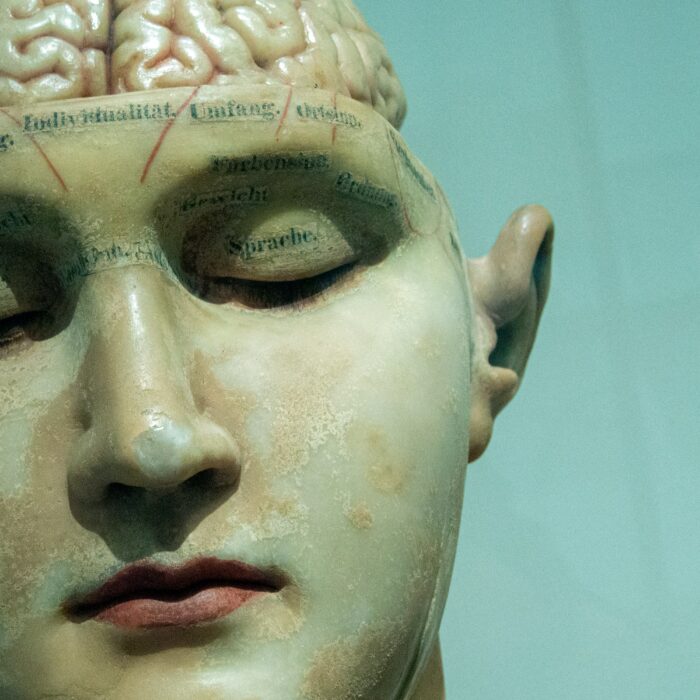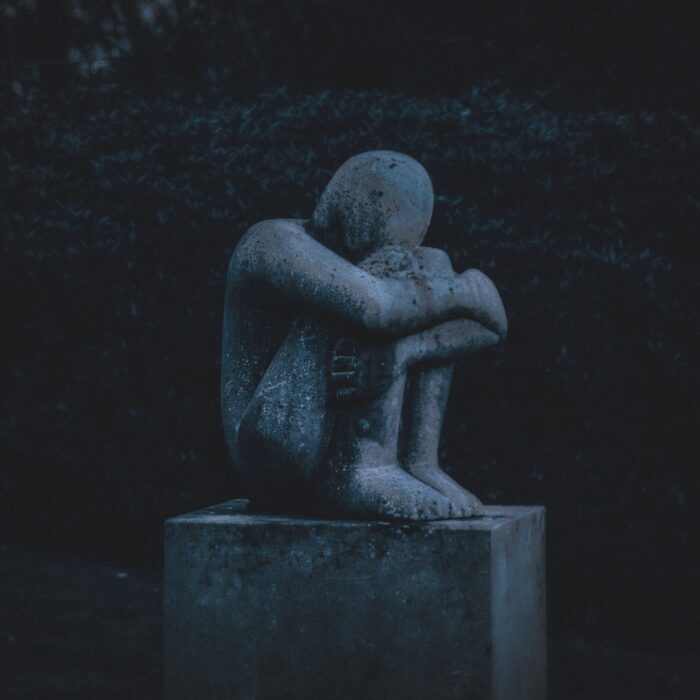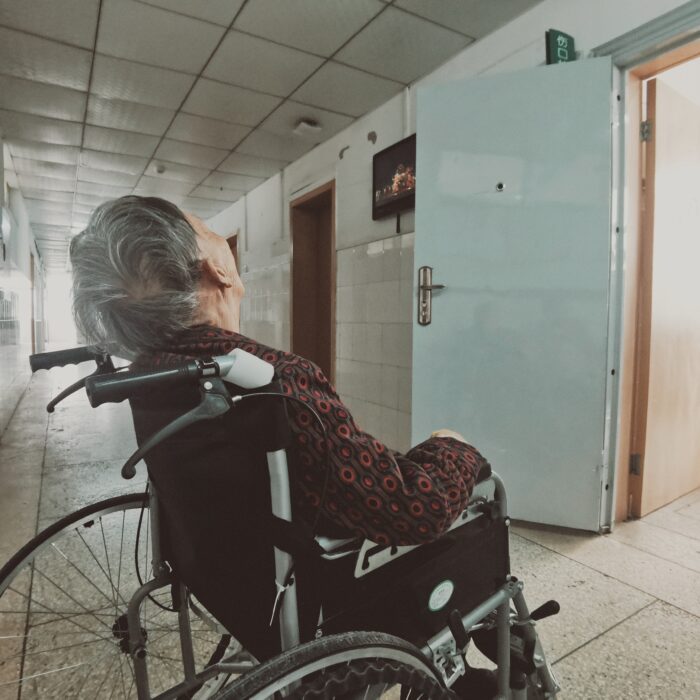You have no items in your cart. Want to get some nice things?
Go shopping
For her ache, she had discovered a cure. It was simple, and in comparison, pain-free. It worked on a basic principle: that a lesser pain is negated by a greater one.
(This was not how she had discovered the cure. The logic had occurred to her later, upon reflection)
To provide an explanation: One does not mourn a stubbed toe with a stab wound to the chest. Or, to reinforce the point, one does not bemoan athlete’s foot when faced with an aggressive, unrelenting cancer of the throat.
At least, not in the initial stages. It takes time and patience, to learn to truly appreciate minor ills.
This ache from which she suffered, then. It was felt chiefly in the lower stomach. Some referred to it as ‘heartache’, but for her, this was anatomically inaccurate, even absurd.
No. This ache was located, specifically, in the pit of her womb. It wrapped itself around her fallopian tubes and enveloped her ovaries, making them blueblack-inky-feeling. A constricting poison-ivy ache. The thick membrane walls of her womb were turned to ash; thick, dry and flaking, dead, from the grief of him.
(But enough about him! This must not be about him. This is about her cure)
First, then; some account of the time before the discovery of the cure.
She would lie awake, unable to sleep because of the dry heat burning up, curling the corners of her, in. Her scorched innards crackled and screeched at her until she would sooner have gone deaf than suffer the sheer endless-wall-sound of it, clutching her head and her stomach in turn.
Of course, though, it made no noise.
Clawing, gnawing, gnashing – these were the words for her now.
When she did sleep, it was frenzied – dream-filled and drenched. She would wake up unable to breath, gasping – ! – her long dark hair wrapped so tight around her throat that, had she remained in sleep another moment, she would have been strangled, blackblue bruises encircling. Similarly, from her tossing and turning, her trunk and limbs would be held fast when she awoke, wound up tight in a cocoon of greywhite, odoured bed linen.
It could take whole hours to become free. If she wished to at all. Sometimes it was easier to wait until the next. Milky light seeping limply through cold metal blinds, to remind her. Or the time after that, even. The ache made the acknowledgement of days entirely irrelevant. The stench in her bedroom would have been described, by an visitor – had there ever been – as intolerable. Sharp and tart, like licking copper coins, or chewing tinfoil.
Other information, from the time before the cure. To give an idea. Her eyes leaked thick yellowing liquid and stuck together when she blinked, so that she was forced to use her fingers, one from each hand, to pry them open, with a small, syrupy ‘pop!’. Her eyelashes grew thick and matted, until she was obliged (so as to be able to use her eyes effectively) to snip them off with a silver nail clippers. Alas, now when the ash from her womb would travel up through her body’s chimney pipes and out her mouth, causing a coughing fit, her eyes had no protection. They would smart terribly and her vision would turn pierced and grey and swirling-sooty.
Speaking truthfully, for her, to die would have been an enormous relief. She could not pretend she did not dream of it; savouring the sensation of it on her tongue, like diving headfirst into cool, seethrough waters on a stifling hot day. A floating free inside them, held by nothing, untouched and groundless; the pure nothing which she coveted. To be free of that screech! But to choose death was widely (she had heard in whispers, bulging eyes fat lips teeth, peering over hunched huddled shoulders in coats macs wrapped on streetcorners at bus stops drizzle) perceived as selfish, and one of her most terrible traits happened to be pride. As well as the desire to be loved.
She lived, therefore, in the time before the cure, a half-lived-lobsided sort of life – a limping sort of life – in the tick and hum of waiting rooms, in-between rooms, swaddled, squinting treacle-eyed, with her ache.
She had been told that time would heal her.
But now for something good to say.
She had always liked to cook. And to eat. More even than was necessary. She had, in her lingering confinement, grown fat. A general heavy thickening of the flesh, and soul, and mind. Dulling layers swelled across her bones, and thoughts. Food cunningly fooled her, however momentarily, into believing that she was becoming filled. Similar to the illusory satiating feeling afforded by semen entering, warming the tummy, or even that of a foetus, leeching and festering, malignant, in the womb. Food afforded a vague respite, if not a cure. Not as of yet.
Upon the eve of her discovery, she was to be found chopping onions at the kitchen sink. The sink faced a window covered in a thin film of grime. The light outside signified evening, although without particular direction or effect. Like a solitary soldier’s pathetic resistance against the pounding bootmarch of an invading army, the sickly light merely struggled, in its closing breath, to ward off marauding, gluttinous dark a little longer. The day was close to death. It was a time for eating. Her glutinous lashless eyes seeped more profusely than usual from the acid-air rising, the onion’s last defense.
She was going to make a tomato sauce with Italian sausage and rich egg pasta and eat it all up in her belly with warm blood-red wine. Wet liquid soft food to quench dry ash. That was her aim.
But briefly, before we proceed, something about her!
She had developed an odour that she was largely unaware of. She had no interest in it. It was not dissimilar to that found at the entrance to Underground train stations at night in summer – heat and engine oil and sweat and animal and piss and sex rising, with a hint of rose eau de toilette. Her skin was pink and grey, strictly only vague hard to see colours, oscillating in the spaces between the real, important ones. She wore a dress of faded navy blue, woollen and religious in its charmless simplicity. Her hair, as I have mentioned, was dark, snaking down her concave lower back into lank, matted strands. It did not invite one to run fingers affectionately through its lengths. Her eyes had once been green. She wiped them with the back of the hand holding the knife, not wanting to release the onion’s juices inside their lids.
There was a certain quality she held, impossible to put one’s finger on, that made men consider in passing, what it would be like to rape her. This, she was aware of.
Her ache ached so much that it took great resolve not to drive the sharp kitchen knife deep into the depths of her stomach and wriggle it around in an attempt to cut out its source. But this was nothing new. She diced her onions finely, and their odour combined with hers, creating a sensual savoury haze. The slight movements in the atmosphere around her eddied and swirled cinders and fumes. The oil was warming in the pan. The radio played freestyle jazz and she listened vacantly, through the din of herself.
It was in this absent ocean-floor state, chopping steadily, that she managed to bring the knife swiftly and expertly down upon the very base of the index finger on the left hand (the one kindly holding the back of the onion in place), severing it neatly and abruptly from the rest of her body. This was a surprise.
Ashen air escaped her mouth in a sharp rush, only to be sucked in again, quickly, between clenched teeth. She dropped the knife with a short clatter onto the countertop. Blood spurted in fits and starts from the twitching finger, and her brand-spanking-new, fingerless stump.
(The blood felt exposed – it had not expected to be revealed to the world at this moment. It had been coursing happily, secretively, through hidden tunnels and passageways, murmuring and giggling like ludic nymphs. It came now in limp rhythmic waves, an unenthused ejaculate, shamefully rouge, like the apple of a whore’s cheek.)
The radio played on – some song about love now. The oil began to emit a faint blue smoke, warning sign of impending fire – too hot, careful! She turned off the gas with her undeformed hand. She paused, allowing the room to settle. She held up her wound, and considered. Blood trickled down her wrist over her elbow, soaking into the cuff of her dress. It was wet and warm. She felt nothing.
She did not feel pain from the wound, certainly – but that is not the point. She felt nothing.
For as long a time as her memory was willing to unfurl, she had known that ache. Now, without warning, there was only numbness – that sought nothing. The realisation flitted behind her eyes. But she did not blink. Her face never stirred. She did not want to openly acknowledge, even within her mind. Someone would see. She felt at once fear, and delirious anticipation. She knew she must conceal the thought, the quickening of the heart; not allow herself to think outright. She breathed through her nose, slowly. If she was not careful now, her ache would awaken, turn back wide-eyed and enraged, from this cheap ruse. It would espy her budding hope, her creep-crawling relief, and with gleeful venom come crashing back down upon her, pinning her down, to resume with redoubled energy its merciless vigil over her crumbling, smouldering wombfire.
(At this moment, a cat-shaped blur leapt up onto the windowsill outside, and peered in with yellow orbeyes. It was attracted, from the wild jungle hedgerow depths, perhaps by curiosity, or the scent of blood, or perhaps a cat’s conscientious awareness of the need, at this point, for a witness. It mewed, and feigned a yawn, sleek pink-armoured mouth displayed, agape)
She felt nothing.
Without a word, without even a flicker across her long pinkgrey-rimmed face, she quickly, asidedly – as though barely conscioius of her actions, as though her thoughts were busy elsewhere, occupied elsewhere – bandaged up her loss. She used iodine and white porous cloth from the dusty first-aid kit, which had patiently awaited such a moment, atop the pine dresser, stood against the beiging wall to the right of the sink. There were, one might note, no framed photographs on her dresser, although there was space for some, had she cause for them.
She took up the knife. She did not wipe off what had recently been her blood, before resuming her exact fine dicing. The severed finger, turning a fashionable off-white now, sat untouched and unacknowledged to the left of her onion slices. The browning red blood had trickled in a small pool across the grooves of the board, dying the layers of onion skin a fleshy pink. Its metallic odour mixed well with the onion’s warm wholesome one. She did not choose to mention to herself what she was doing. The part of her mind in control of doing life’s actions and the part of her mind in charge of taking note of those doings were not in contact with one another just then. She had cut the line. It was easier that way. At this moment, she simply was. It was similar to that state of animalistic orgasmic rapture in which one can focus only on the feverish here and now, the sating of a primal need – but calmer, more controlled; much like the greatest acts of foreplay. She would not rush.
She reignited the gas-flame, and tipped onion shards into sizzling virgin oil. They hissed appreciatively in the pan, sending envoys of flavour to her nostrils and across the kitchen in thanks. They were accomplices in this. The cat-shaped blur watched indifferently. Paused to lick. She added crushed garlic and chopped tomatoes and a little squeeze of lemon, black pepper and salt and a few basil leaves. She added one teaspoon of granulated sugar. And she continued to feel nothing. On the radio, the song – something about people and life – evinced no apparent reaction from her. The sounds provided useful noise for any audience. Distraction. (Songs pull scenes together). But she realised, somewhere in the quiet places, behind her clanking mind, that she could hear it, clearly. There was no other sound. There was no screech, just then.
The sauce bubbled and reduced and thickened. She, with little difficulty, considering her recent disfigurement, opened the wine bottle that had been warming by the furnace, and drank deeply from the glass, standing over her pot, gazing. Her pasta was simmering and her table was laid. She had lit a long thin candle with a match. She took out her sweet Italian sausage from the fridge, and smacked the pack with a meaty thud onto the blood-infused chopping board. Her finger lay dead and unburied, slightly to the left. She had not actively remembered nor ever forgotten it.
She took her sausages, and cut them down the middle lengthways. She then cut them crossways several times, to create small chunks. She threw them all into the greedy hellpit-red sauce. Next, she took the finger – cool like an old man’s cheek – and slit it down the middle, from the fingerprint-tip to the amputated end. She put down her knife, and neatly removed the chipped nail from its redraw bed, and the long skinny bone from the centre. This, she put aside, for the hungry cat shape, watching. When she had completely divided it into two long halves – it was an elegant finger, she could appreciate that now – she chopped it up crossways into neat little chunks, and, with a swish of the blade, scraped them down off the board and into the pot.
Now, how to convey the following to you.
It was the greatest meal she had ever eaten in her entire life. Including the meals eaten in that long-forgotten time before the ache. It was intoxicating. When her plate was finished, she piled it up again, until every last scrap had been devoured and she had licked it clean. She opened a second bottle, and finished it. She ate with such furious intensity that she lost her breath. Sauce spilled down her chin and onto her chest, embedding itself in little caking dollops on her dress.
No earthly ecstasy had ever come close to this for her. Her eyes dilated and her body grew supple and soft and willing. She wanted all of it, thick and red and heady, and she ate it deep down into her belly. It flooded through her body heating it from the inside so that steam rose off her skin, making it glow a blazing cerise. Her palms and crotch and behind her knees grew stained and sodden with heady perspiration.
Her meat, cooked to perfection, melted in the mouth.
With each bite, she felt stronger. Fiercer. She felt by the end like she wanted to tip over the table and set the house on fire and fly screaming naked down the street, limbs asunder and eyes ablaze. She was invincible!
She laughed in the face of her ache. She could laugh with her head back, a gutteral rupture straight from the depths of her, booming, with no secret silent sounds of echoing despair, that sound travelling in rolling waves from the centre at a higher pitch; one heard only by animals, and visible, in violaceous shades, only to the fellow-afflicted.
She no longer felt nothing. She felt good. She grinned. The cat mirage was gone, having eaten its scraps, and so lost interest, or courage.
This is the point at which our story must be a montage of sorts. It can only now provide a sense of things.
She visited friends, she dined out, she chatted with her mother uninhibitedly, even giggling occasionally. She polished the hall mirror, she vacuumed the stairs and behind the couch, and her skin had never looked so good. She must have been using new products, because her hair had achieved a sleekness previously undreamt of. She bought new clothes from highstreet shops and organic cheeses from markets. She caught the eye of men who wondered what it might be like to rape her, and she smiled coquettishly at them, knowing. She wore the colour purple, and brushed her teeth twice a day, every day. She was so ravishingly engaging to the eye, that not one person noted her missing finger. It was so trivial, a nothing, compared to what she had gained!
She was the embodiment of femininity and her womb glowed a radiant gold that blinded the women around her and evoked that highly desired female affliction, envy. She was ripe and fresh and fertile, ready for plucking.
It lasted approximately two and a half months.
Without her knowing, a blackblue inky pearl of history and memory, too small and young to be seen by the naked eye, created itself from nothing inside of her, and attached itself, surreptitiously, to the moist wet welcoming walls of her motherwomb.
She went to plays by up-and-coming playwrights and tried oysters and laughed at comedy and read Shakespeare’s sonnets on trains. But the pearl grew, feeding itself on her throwaways, on the things she would rather not have, or acknowledge. Her house grew vaguely musty, and she found herself running out of clean underwear every now and again. There was hair in the shower drain, and she grew uneasy. She awoke once in the night, slightly restless. She tripped up in her heels when dancing. Wine made her eyes, which had become so bright and clear and appealing, slightly pulpy. She developed cradle cap on her scalp, like a baby, and found herself scratching it on dates, so that the flakes of skin would waft down dreamily into her main courses.
In six months she was back where she had started – only worse. Her eyes were now so deeply afflicted by that viscous-gummy puss that she was completely unable to open them. She was blinded with it. She wore what had once been a cotton cream-white handkerchief, tied around her skull like a blindfold. It had initials on it but of whom she did not care to wonder, or recall. She nails were fraying at the edges, and there were red blotches on her thighs.
The pearl, so small and inconspicuous, had been her ache in disguise, reborn and vengeful. Her womb had been incinerated in the final stages of its fiery gestation, leaving the entire inside of herself filled solely with the dark black heaving mass of ache. She could see it moving around within her, pressing against her skin causing rifts and bumps, like snakes contorting under silk.
Damn! She needed to be cured again. For longer this time. More thoroughly. She would do whatever it took.
It took the lower half of her left arm, from the elbow down.
She made a roast, and feasted on it long into the night. She accompanied the meat with creamed potatoes and delicately steamed carrots and broccoli dressed in lemon and butter respectively. She flavoured the roast itself with rosemary and garlic and covered it in generous glugs of oil, to keep it moist. She cooked it slowly, for hours. The smell filled the entire street on which she lived, making her neighbours’ husbands’ mouths water with desire. She worked slowly and methodically. She would have to stop short every now and then, and bend down low and groan and hold her stomach, from the sheer searing pain of it.
This meal was greater even than the last. Tears escaped her tightly encrusted eyes, and she understood the expressions artists gave to saints in paintings.
The effects lasted a full year. Nobody noticed the missing limb. It was such a minor loss, for so great a gain!
After the year was out, she barbecued a leg and ate it in the back garden with Sauvignon Blanc and candles to keep the flies away.
Later, she made a meatloaf using the tender minced flesh of her breasts.
Her meals kept her going for another four years. She learned to play bridge and developed a fondness for origami. Her father died in the Spring of one year and she wore a black dress to the wake and people brought sandwiches and told her that he had been a great man. She changed supermarkets, as she didn’t like the customer service at her usual one, and thought it was about time she did something about it. She accrued money and bought an opal necklace that was greatly admired by all who saw it, draped around her supple neck.
Eventually, she placed her bathtub on top of the furnace in the front room, and filled it with water. She waited for the water to boil, standing, with her cane for support, in her silk white dressing gown and slippers, birthday presents from her grandmother. Wedging the top of the cane under the armpit of her severed-from-the-elbow left arm, she used her right to drink her deepdark, oaked red wine, and to garnish the bath water with thyme, and rosemary, onions and garlic, carrots and celery, along with anything else appetising she could find in the kitchen presses. She did not want anything to go to waste.
When it was ready, the room was filled with a hot delicious steam so thick that, standing in the doorway, you could not have seen her fleshy pink uneven form emerge from under her discarded dressing gown. You could only have heard the muffled splash, the sharp intake of breath, as she lowered what remained of her body into the boiling stew-water. You would have been so confused as to what was actually happening, that there is no way you could have dashed across the small dark front room, with midnight blue walls and brown cloth couches, in time to save her, to kick the bath from its precarious perch, and free her already irrevocably boiled scorching flesh from cooking any further.
You might, though, depending on your tastes, and your person, have had the good grace and practical sense, to stroll back into the kitchen. To lay out a single plate, and a knife and fork. To pour out the remains of the wine, and wait, oh, say about two hours or so, for the meat to become perfectly tender and juicy, so that it simply fell from the bone, and had to be eaten with hot greasy underhands, with paper towels, and finger sucking.
If this, after weighing it up and down, is the option you think you would have chosen, you could then perhaps have put on the radio as you waited – a song, something about a woman – maybe borrowed one of her books, to pass the time. You could have put your feet up.
Or perhaps you could have used the somewhat solemn occasion to muse on what a waste her death had been, how unfortunate, that she could not have seen sense, gotten on with things, after. Time would have healed all, you’d have thought, sighing, for effect. You could have remembered her in life, and, growing drowsy, with the steamy heat and comforting cooking smells wafting through the house, in your shadowy heavy-eyed musings, you would have wondered, inevitably, what it might have been like to rape her.

About Lucy Sweeney Byrne
Lucy Sweeney Byrne is a writer of essays and short stories. She has had her work published in Headstuff, Banshee, The Bohemyth, The Incubator and The Stinging Fly.




